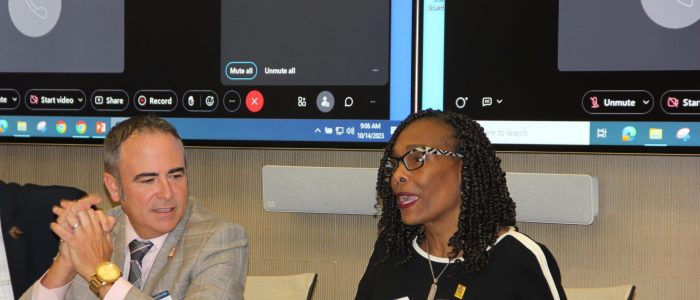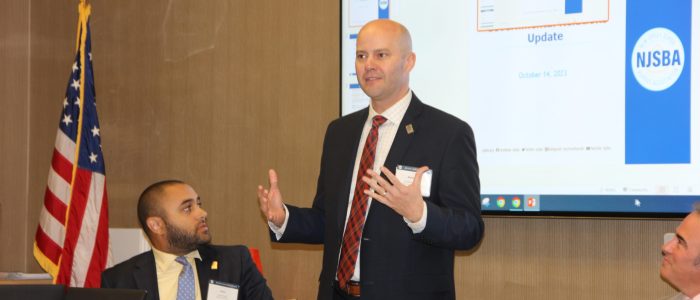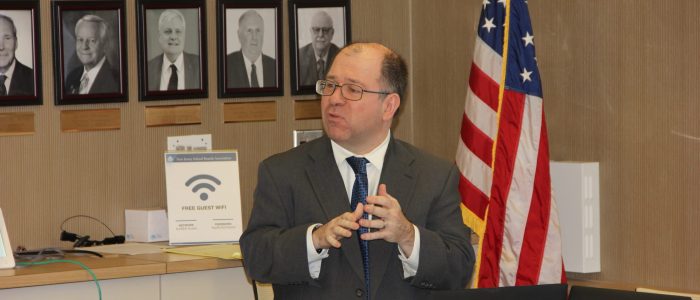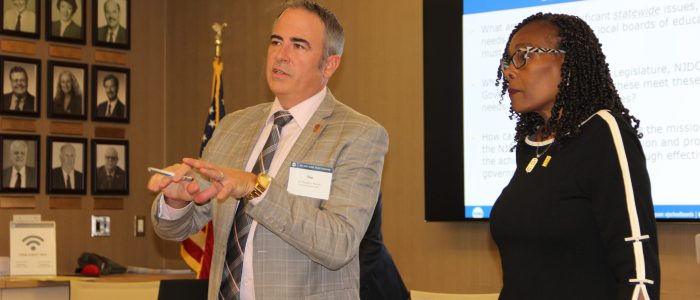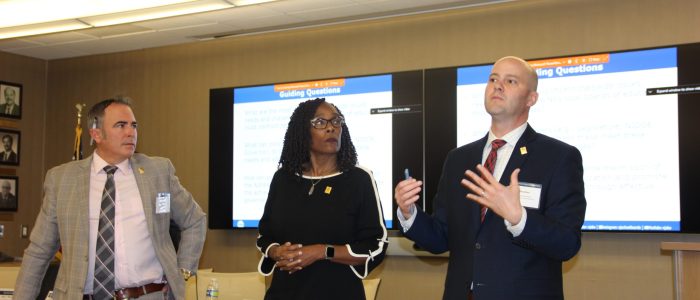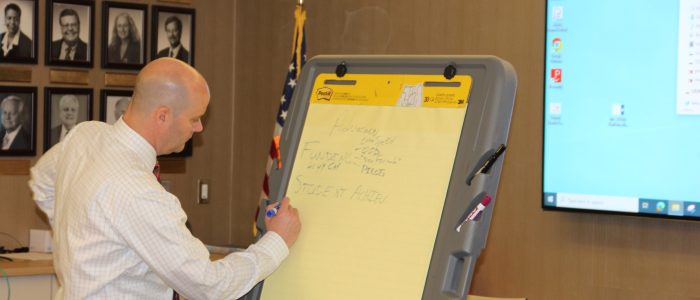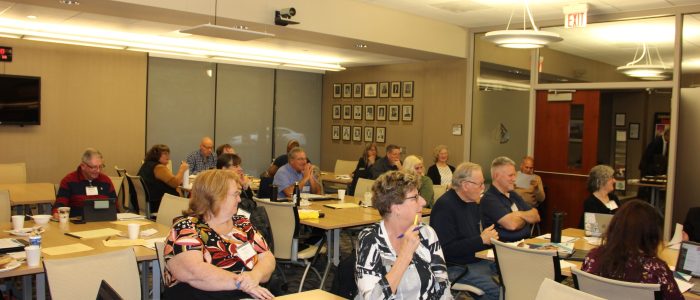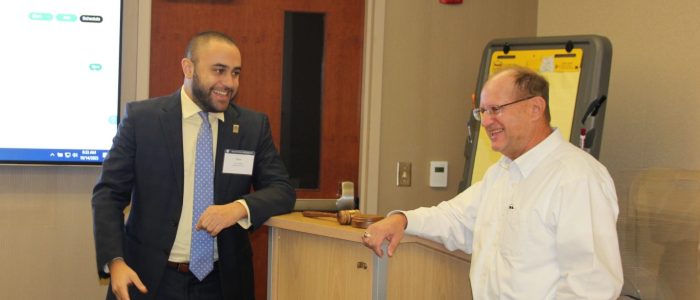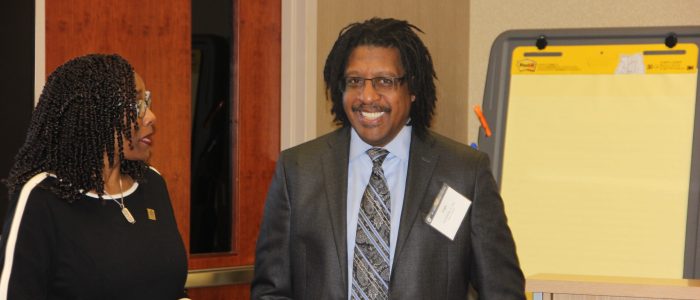The Legislative Committee of the New Jersey School Boards Association returned to an in-person gathering for the first time since the onset of the COVID-19 pandemic on Saturday, Oct. 14 at the Association’s headquarters in Trenton.
Chanta L. Jackson, vice president for legislation/resolutions, presided over her first such meeting as a recently installed officer of the Association, noting that her predecessor, Dr. Karen Cortellino, now NJSBA’s president, left big shoes to fill.
Cortellino, who became a grandmother for a second time on Oct. 10, joined the meeting virtually, and thanked members for all their hard work. “This committee really does have an impact on students,” she told attendees, adding that Jackson “will be a wonderful vice president for legislation/resolutions – and I know you are in good hands.”
Dr. Timothy Purnell, executive director and CEO of NJSBA, said it was incredible to enjoy a deeper level of connection by meeting in person. “You better believe that you inform the work we do and that our Governmental Relations team does on a daily basis,” he said.
He highlighted how NJSBA Connection, a centralized hub where school leaders can collaborate on projects and initiatives, is allowing board members to extend that connection into a virtual setting. A new NJSBA website – one that is more user-friendly – is also in the works, he said.
“I’m thrilled to have you on board wielding the gavel for the first time,” Purnell said of Jackson, who called the meeting to order.
Jackson said she was excited to be meeting in person at NJSBA’s headquarters.
“Although COVID taught us to pivot, it is a good thing to sit here and see faces and actual reactions,” she said. She went on to introduce herself, noting that she is a former journalist who is now the communications officer and registrar at Asbury Park Schools and the president of the Neptune Township School District’s Board of Education, on which she has served for 11 years.
Some of the issues she feels strongly about include advocating for legislation to streamline the teacher certification process, expanding reciprocity between states, promoting career and technical education programs, teaching boards how to reduce reliance on state aid, advocating for a more equitable school funding formula and expanding social and emotional learning supports for students, she said.
Jonathan Pushman, the Association’s director of governmental relations, delivered a report to attendees and also highlighted how happy he was to be meeting in person again. “The feedback I heard is that our members missed being together on Saturday mornings,” he said. “This is an opportunity to talk to everyone about everything going on in their districts.”
He added, however, that virtual meetings are not going away – especially during the winter months when the weather can be unpredictable. Guest speakers can also more easily commit to a virtual meeting, he said.
Pushman, alongside Senior Legislative Counsel John J. Burns and Legislative Advocate Jesse Young delivered a detailed update on legislative developments in Trenton as well as what to look out for in the weeks and months ahead. “I haven’t had too many opportunities to be in person with our members and hear firsthand what your experiences have been, and what your values and priorities are, so I really value this opportunity and look forward to getting to know all of you,” said Young, who joined NJSBA less than two years ago from the New Jersey Department of Education.
Some of the topics Young highlighted included supplemental stabilization aid, preschool expansion aid funding, efforts to recruit more teachers and the New Jersey Statewide Student Support Services initiative (also called NJ4S).
NJ4S prompted some questions from the audience, and Pushman observed that how to best deliver social, emotional, and mental health supports to students has been debated for years. While the state is expected to continue implementing a hub and spoke model, he said funding for existing programs at schools is continuing – and that the Legislature has been “very engaged” whenever there’s talk about eliminating such programs.
Purnell urged attendees to attend a Workshop program, NJ4S: A New Initiative Launching in September 2023, which will be 12:30 to 1:30 p.m. on Monday, Oct. 23. That session will be delivered by Sanford Starr, assistant commissioner of the New Jersey Department of Children and Families. “It will be a great session to go to and learn more about the hub and spoke model – and to ask questions,” he said.
NJSBA staff also highlighted the current status of extraordinary special education aid, substitute teacher requirements, the responsibility of board members in evaluating harassment, intimidation and bullying allegations and a new law that expands eligible uses of sick leave for school employees.
Burns observed the new law allows teachers to take sick days for additional uses other than personal illness, such as caring for a sick family member, for personal or a family member’s preventive medical care, or “to attend a child’s school-related conference, meeting, function or other event requested or required by a school administrator, teacher, or other professional staff member responsible for the child’s education.”
As this is the first school year implementing this significant expansion in employee benefits, Burns observed that it is likely that the state will see challenges in school districts as the boundaries of the additional allowable uses are tested for the first time. “I am sure as time progresses, we will see some cases that either muddy the waters or clear them up,” he said.
As for HIB, Burns noted that NJSBA recently submitted testimony on this topic before New Jersey’s Anti-Bullying Task Force, which recently held two public hearings to provide families, students and other stakeholders an opportunity to share experiences regarding the implementation of the Anti-Bullying Bill of Rights Act in New Jersey schools.
Burns observed that a fund meant to prevent bullying has not been funded in several years, raising potential “unfunded mandate” concerns. NJSBA is seeking clarification on the role of boards in terms of affirming, rejecting or modifying a superintendent’s recommendation when it comes to HIB, he said.
At the state hearings, there was a lot of discussion revolving around the idea that what the public believes is bullying is sometimes different from what the state statute defines it to be. While some argued that the definition of bullying in the statute should be expanded, others argued that the word “bullying” itself should be removed, Burns said.
Attendees also broke into groups to plot a path of advocacy items that the Association will focus on in the new legislative session that begins January 2024. Every two years, the committee develops an advocacy agenda that is submitted to the NJSBA board of directors for final approval.

